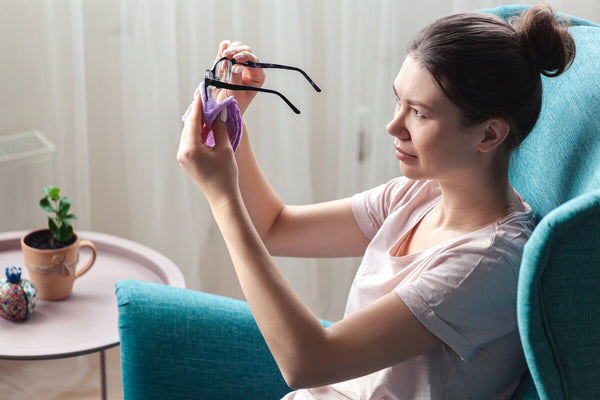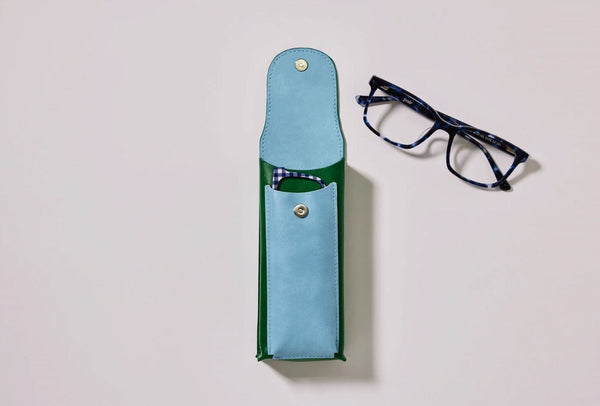How to Remove a Cloudy Film From Eyeglasses: 3 Easy Hacks
October 5, 2022 • 1:41 AM
It’s easy to forget to clean your glasses. You’re going about your day and suddenly you realize you’re seeing the world through a haze. Looking through dirty glasses can lead to squinting, which may cause eyestrain and headaches. It’s also possible that bacteria on your glasses could increase the chances of an eye infection. Luckily, this is a simple problem to solve.
Let’s talk about how your glasses get into that state and then how to remove a cloudy film from eyeglasses. We’ll also suggest some ways to protect your eyewear so you don’t have to clean it quite so often. Before you know it, you’ll be seeing the world clearly again.
Why Your Eyeglasses Get Cloudy
There are many reasons your eyeglass lenses get grimy, including:
-
The natural oil from your hands (or your hand cream) gets on your glasses as you put them on and take them off.
-
If your glasses aren’t fitted properly and they’re touching your face, the oil from your skin will transfer onto your glasses.
-
Both moisturizer and foundation can leave traces on your glasses.
-
Long eyelashes may touch the lenses, smudging them with mascara.
-
Your skin is constantly shedding old and dry flakes, which can get on your lenses.
-
If your glasses tend to fog up — something that happens a lot if you’re wearing a mask — that can leave water stains on the lenses.
-
If your eyeglasses slip down your nose and you’re constantly adjusting them, you’re likely to smudge the lenses with your fingers.
-
If your glasses are scratched — especially if you have plastic lenses — it can look like they have a cloudy film.
-
There’s a natural buildup of grime that happens over time, especially if you live anywhere there’s even a moderate amount of air pollution.
- Hard water stains can also affect your glasses and cause mineral buildup, especially if you often hand-wash your pair in the sink. This process can also leave soap scum on the lenses, clouding them up more — similar to what you might notice on cutlery or drinking glasses.
Any of these factors can lead to wondering how to remove a cloudy film from eyeglasses.
How to Clean Cloudy Glasses

Now that you know why it happens, we can focus on how to remove a cloudy film from eyeglasses.
Note: If your glasses are badly fitted or the lenses are scratched, you’ll need to visit your eye doctor to get this sorted out.
Otherwise, these are the three easiest hacks for cleaning eyeglasses. Whichever method you choose, aim to give them a good clean at least once a week and be sure to handle them carefully so you don’t damage them.
1. Use a Microfiber Cloth
If your glasses aren’t that dirty — and your microfiber cloth is very clean (otherwise you may simply smear dirt around) — you can try this first. You likely received a microfiber cloth with your glasses when you first got them, so hold onto that.
Microfiber cloths are made of tiny, tightly woven fibers. This gives them a much bigger surface area than normal fabric and makes them far more effective at trapping dirt. As a bonus, they don’t leave lint on your lenses.
Holding your glasses by the nosepiece in the center — and being careful not to touch the lenses in the process — give them a gentle wipe with a clean microfiber cloth. Use a circular motion rather than a scrubbing one, which could cause damage.
Clean your microfiber cloth regularly, either by hand or by washing it with similar fabrics. Make sure you use bleach-free soap and don’t add fabric softener. Fabric softener coats the fibers and makes them less effective, and it can also leave streaks on your lenses. Once it’s washed, leave the cloth to air dry.
Microfiber cloth is designed to trap dirt, so once it’s clean, store it in a sealed bag to keep it that way until you next need it.
If you’ve neglected your glasses for a while though, a microfiber cloth may not be enough — or might make it worse. You’ll then need to move on to one of the other two options.
2. Wash Your Cloudy Eyeglasses
When determining how to remove a cloudy film from eyeglasses, one of the best ways is to wash them thoroughly with warm water and dishwashing liquid. Note that if your area has hard water, you may want to use distilled water instead of tap water.
Prepare your bowl of warm water (not hot water, as this may damage any lens coatings, or cold water, as this isn’t as effective) and add a drop of dish soap, then swirl it around to mix it well.
Make sure your hands are clean, then lower your glasses into the water and use your fingers to gently rub both sides of the lenses. If you have any buildup of grime around the nose pads, temple arms, or ear hooks, you can use a soft toothbrush to clean that off.
Then gently rinse them off using running water. Be careful not to touch the lenses with your fingers at this point. Use a soft cloth — make sure it’s clean and lint-free — or microfiber fabric to gently wipe them dry.
3. Use Lens Cleaner
It’s a good idea to have cleaning wipes and a small spray bottle of lens cleaner handy for a quick clean when you need it. Make sure the cleaning solution is specifically labeled as an eyeglass cleaner though. Some cleaning solutions are very harsh and can damage your lenses or coatings.
First, blow off any dust to make sure it doesn’t scratch your lenses. Then spray a little of the lens cleaner onto a clean, dry cloth (again, lint-free). Gently rub your lenses to remove any cloudiness.
Precautions When Cleaning Your Glasses
If you search online for “how to remove a cloudy film from eyeglasses,” you’ll find suggestions for homemade lens cleaners that may recommend using Windex, rubbing alcohol, isopropyl alcohol, cloudy glassware cleaners, dishwashing detergent, acetone, white vinegar, or lemon juice — or some combination.
Be careful with these though as they can damage lens coating — whether that’s scratch protection, anti-reflective coating, or UV protection. Never use these substances without diluting them with water first.
On the other side of the equation, breathing on your glasses isn’t terribly effective, and it’s unhygienic too.
Don’t use any of these materials to try to clean your glasses either:
-
Toilet paper
-
Tissue paper
-
Paper towels
-
Napkins
-
Wool
-
Your clothes
They may look and feel soft but — especially if they’re dry — they can scratch your lenses.
Also, note that it’s a myth that toothpaste helps repair scratches in your glasses. Other products that claim to repair scratches may make the scratches look less prominent, but there’s a good chance they’ll also damage your lens coating.
How to Protect Your Clean Eyeglasses

Once you’ve figured out how to remove a cloudy film from eyeglasses, it makes sense to try to keep your eyewear as clean as possible.
When you’re not wearing them, store them in a glasses case — with a hard shell if possible. If you don’t have a hard-shell case, you can use a softer case but keep it protected in your bag or briefcase. Pair Eyewear’s glasses case keeps your eyewear safe. As a bonus, it looks as stylish as our glasses, and has space for two Top Frames too.
When you take your glasses off, try not to touch the lenses. And if you put them down for a moment, don’t rest the lenses on the surface.
These simple actions can help protect your glasses and keep them cleaner (and scratch-free) for longer.
Should You Get Your Glasses Professionally Cleaned?
If your glasses are covered in a stubborn buildup of oil and dirt that causes them to cloudy moments after you clean them, professional cleaning might help. A professional cleaner has the tools and skills to remove serious buildup off a glass surface like your lenses, and they’ll also take great care to protect your glasses during the cleaning process.
Many optometrists recommend getting your glasses professionally cleaned at least once a year or as often as you have a routine eye exam to make them look brand new again. Alternatively, consider swapping your glasses for a new pair after every eye checkup. If your prescription has been updated, you’ll need new glasses anyway, which gives you an excuse to go to the Pair shop and order some new frames.
Do Dirty Glasses Affect Eye Health?
Keeping your glasses clean doesn’t just make them look better. It also makes them more effective and safer for your eyes.
Dirty and smudged lenses can make your eyes work harder to focus on written text or a digital screen. Even though the difference in effort may be small, it can lead to eye strain, which is acute and uncomfortable at best… and a chronic eye health issue at worst.
In addition, dirty glasses make it harder to see clearly in general, something you’ve probably experienced before. Cleaning your lenses regularly can help you feel more comfortable when you need clear vision the most, including when driving or focusing on close-up objects.
Moreover, dirty glasses can put your skin at risk of breakouts and even infections. As oil and dirt build up on your frames, this debris can clog your pores, leading to acne and other issues. A quick cleanup with dish soap and a microfiber towel can make a huge difference, especially if you have sensitive or acne-prone skin.
Clean Your Glasses Regularly
Your glasses are exposed to a wide range of factors, from pollution in the environment to the oil from your own skin, so it’s natural that they’ll get grimy. Cloudy glasses can really dim your view of the world, so make sure you clean them regularly using one of the methods we’ve recommended.
Looking for a new pair of glasses? Pair Eyewear offers a wide range of women’s, men’s, and children’s styles that are budget-friendly starting at just $60. Best of all, once you’ve selected your Base Frame, you can order as many Top Frames as you want to switch them up from day to day. Plus you can add a handy cleaning kit — with its own portable pouch — to your order to keep your glasses clean on the go.
Treat your glasses well, clean them when they need it, and both them and your world will sparkle again.